Tensions in the Middle East are rising once again, this time in the country of Yemen. A terrorist group backed by Iran is now going on pirating sprees in the Red Sea, across the Gulf of Aden from Somalia, the nation of Yemen which has been enduring a brutal civil war since 2014 and is being dominated by the Iranian-backed Shia Islamic Group known as the Houthis.

The Houthis, with their military and financial backing from the country of Iran, are currently in control of a ⅓ of Yemen’s territory, which includes a whopping “70 to 80% of the population” of Yemen (U.S. Department of State). This terrorist group, although nowhere near as militarily advanced as countries like our own, still poses a great threat, and has become more violent in the Middle East since the latter half of 2023.
To understand why, we must first go over the recent events occurring in the Middle East’s history; under the Presidency of Donald J. Trump in October 2019, Abu Bakr Al-Baghdadi, the founder of ISIS, an extreme Islamic Terrorist group that has devastated and ruined the lives of thousands for decades, was finally killed with other high-ranks of Isis, marking the start of the continuous decline of Isis. Later on September 15, 2020, after decades of fighting wars and terror between Middle Eastern nations, momentary peace was achieved under the Trump Peace Plan.
Finally, you may have wondered at the time, peace is finally coming to the Middle East… and you’d be dead wrong! Under the first year of President Joseph R. Biden, the U.S. withdrew from Afghanistan after being stationed there for over two decades, and the entire procedure was rushed and disastrous, an utter failure. The U.S. left millions of dollars worth of equipment, on August 26, 2021, 13 service members were murdered by a suicide bomber outside of the Kabul Airport, and thousands of desperate Afghan civilians clung to the sides of American aircraft in attempt to escape the oppression and authoritarian state that was to come following a Taliban takeover.
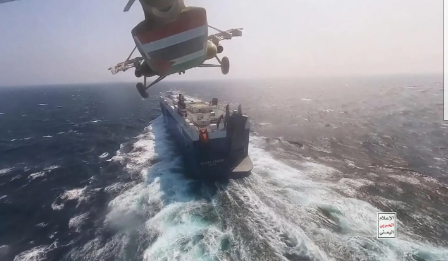
Now you may wonder, what Afghanistan has to do with this, it displayed that the U.S. was becoming less willing to fight, and unfortunately, the U.S. humiliated itself with this event, showing weakness to the world. In response, countries like Russia with Vladimir Putin gave the okay to invade Ukraine, China has been more ambitious with its threats over Taiwan; tensions are continuing to rise in the South China Sea steadily, and Iran has become more audacious with its funding of terrorist groups, one of which is the Houthis.
After the Israeli invasion of the Gaza Strip in October of 2023, the Houthis declared shortly after in November their unwavering full support for Hamas and the destruction of Israel. However, the Houthis are located in Yemen, over 900 miles away from Israel, and over 1,000 from the Gaza Strip, but what they did have to their advantage is their strategic and easy access to the Gulf of Aden and the Red Sea. The Red Sea, connected to the Suez Canal, serves as one of the most, if not, the most trafficked maritime trade routes in the world, with an estimated 12% of global trade occurring in this route alone.
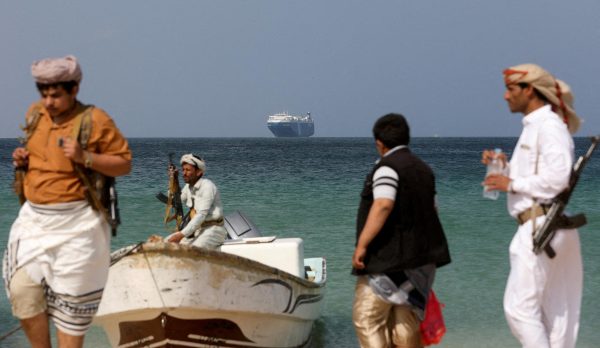
The group declared that they would attack any ships with any links to Israel, the United States, or Britain, but according to Marinelink, “shipping industry sources say all ships could be at risk.” On November 19, 2023, the Houthis boarded and hijacked the car-carrier named the Galaxy Leader, according to a December 5, 2023 article by Reuters, “The Bahamas flagged car carrier was taken to the port of Hodeidah in the Houthi controlled north of Yemen after being boarded at sea on Nov. 19 by commandos with the group. The vessel’s crew is made up of nationals from Bulgaria, Ukraine, the Philippines, Mexico, and Romania, Galaxy Maritime said.”
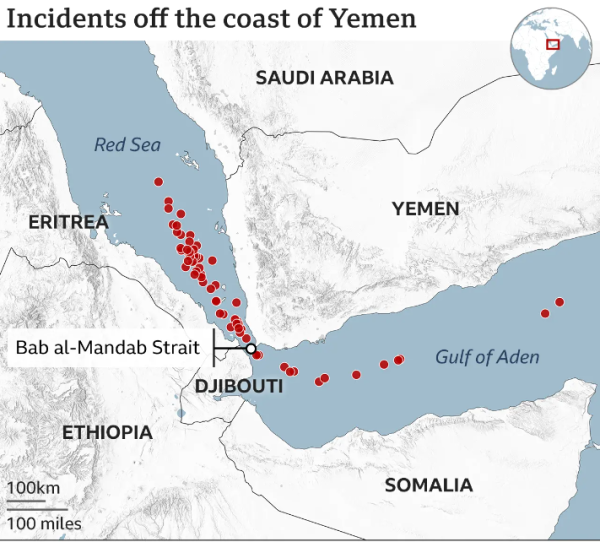
Since November, according to Al Jazeera, “17 vessels,” in the Red Sea alone, “have been hijacked” according to data from Ambrey Analytics and there have been many more attacks from the Houthis due to their access to very effective cheaply manufactured Iranian-built missiles. On Wednesday, March 7th, 2024, the Houthis launched a missile that struck the True Confidence Vessel, killing three crew members and forcing the surviving crew members to abandon the ship.
Due to this crisis happening in the Middle East, global trade will be impacted significantly. Since the Gulf of Aden & Red Sea are tumultuous areas that could lead to an unprovoked hijacking or attack on your ship, ships must resort to the medieval centuries-old trade route from Asia to Europe (or vice versa) where ships are now required to sail to the southernmost point of Africa, around the Cape of Good Hope, only to travel northbound once more.
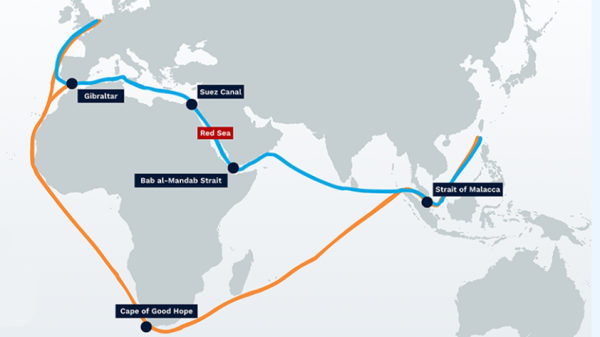
For the sake of example, we will say a ship from Singapore is bound for Rotterdam. Through the Red Sea and Suez Canal route, a ship will travel about 8,500 nautical miles, approximately 26 days of maritime travel. Now with the threat of Houthi Pirates in this very traversed area of the globe: these ships are left with no choice but to sail around the bottom of Africa to go all the way back North, adding an extra ten days of maritime travel and raising the number of nautical miles to approximately 11,800 miles (Real Life Lore).
Furthermore, prices are expected to rise for a lot of different things. AP News stated in an article released on January 27, 2024, “As of Jan. 19, Flexport says, almost 25% of global shipping capacity is being or will be diverted from the Red Sea, adding thousands of miles and a week or two to trips. The cost of shipping a standard 40-foot container from Asia to northern Europe has surged from less than $1,500 in mid-December to nearly $5,500.” Keep in mind, that is 5,500 dollars for one singular container! These vessels typically carry about 24,000 TEU (Twenty-Foot Equivalent Unit) containers, which, according to porttechnology.org, can cost around 239.85 million dollars!

One may beg the question, how is such a barbaric band of terrorists coming by missiles and vehicles that allow them to take the lives of innocent crewmembers and hijack entire cargo ships? The finger can be pointed solely at Iran. In the past few years, with less American military presence and less threat from other superpower countries, Iran has become far more audacious in its backing of multiple Islamic extremist terrorist groups, supplying organizations like Hezbollah, Hamas, and the Houthis (American University) & (U.S. Department of State).
According to the United States Institute of Peace, “It is believed that Iranian intelligence, technology, and weapons have enabled the Houthis to conduct their attacks in the Red Sea. Supporting the Houthis has been a low-cost investment for Iran. This support has grown to a strategic relationship with high returns. (Jan 12, 2024)” and on March 14, 2024, according to the Boston Globe, “Yemen’s Houthi rebels claim to have a new, hypersonic missile in their arsenal, Russia’s state media reported Thursday.” Furthermore, “Abdul Malik al-Houthi, the Houthis’ secretive supreme leader, said the rebels will start hitting ships heading toward the Cape of Good Hope in Africa’s southern tip. Until now, the rebels have largely struck ships heading into the Red Sea toward the Suez Canal, and such an escalation would target the longer, alternative route used by some vessels.”
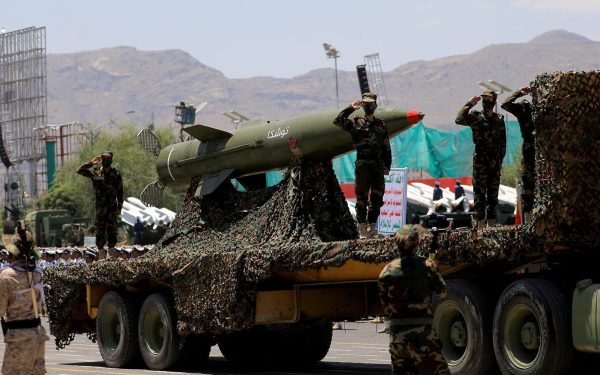
The combination of wars in the Middle East, the return of piracy in the Gulf of Aden and the Red Sea, the disruption of one of the most globally trafficked trade routes in the world, with the risk of Houthi attacks persisting even outside of the Red Sea, Iran becoming more audacious with its proxy wars and power-grabs, and the resurgence of power to these terrorist groups in the Middle East could prove to be incredibly impactful for the remainder of the 2020s, and the Houthis are no exception to this. Terrorists are groups that demand something often unjustifiable and will brazenly go to inhumane measures to provoke fear in the lives of people to get what they want. The Houthis are posing a threat to the well-being of thousands of innocent crewmembers and threatening international maritime trade, the Western world cannot remain idly by and allow this to happen.
The 2020s have yet so far been a catastrophe for the Middle East, and something needs to be done to these terrorist groups to preserve global peace and prosperity, the Houthis in particular are a group that needs to go. Otherwise, we may face even higher prices and, if the Houthis don’t get their way: with backing from Iran there is no doubt that the Houthis can escalate tensions and provoke dire wars in the Middle East, not limited to the neighboring countries but also countries from all over the Western World.
Photos Courtesy of The Boston Globe, Counterpunch, Forbes, Reuters, BBC, acslogco.com, The Times of Israel, & The Seattle Times.







